How have Iowa-born companies transformed both local and international business?
Some of the first business ventures were the mills along Iowa's rivers that ground grain or cut logs into lumber. Clinton was once reported to have more millionaires per capita than any other city in the nation thanks to the success of several lumber dealers. Private railroads received a bonanza when the federal government provided land grants to four trunk lines. The rails were allocated additional acres along the proposed routes as they completed the required numbers of miles of track. The companies sold the land and used the money to finance line construction.
Coal deposits across southern and central Iowa provided fuel to Iowa railroads, households and a few early businesses. However, Iowa's soft and smoky coal was inferior to the hard anthracite in Pennsylvania and West Virginia. In the latter 19th and early 20th centuries, however, local mines employed hundreds of miners. Many were immigrants from Wales, Italy, Croatia or Sweden and added ethnic diversity to the population. Mining was often part-time work, and the miners had to find other employment. When train engines began shifting to diesel fuel in the 1920s, most of the mines closed and many mining towns disappeared.
Iowa and Agriculture
Agriculture has always been Iowa's major industry and the roots of many of Iowa’s first business ventures. The invention of the refrigerated railroad car led to the rise of meat-packing in Iowa. Before refrigeration, livestock dealers had to pay for cattle and hogs to be fed and watered on their way to Chicago stock yards. With refrigeration, slaughter houses in Iowa dressed beef and pork and sent it to eastern cities. Meat packing was the leading manufacturing industry in the state at the turn of the 20th century.
The manufacture of agricultural machinery included some significant Iowa industries and became a major source of employment. John Froelich invented the first gasoline-powered engine mobile in the field. In 1895, along with some business partners from Waterloo, Froelich formed the Waterloo Gasoline Engine Company. After World War I created a demand for the tractor, the company was purchased by John Deere, an Illinois-based company that manufactured a full line of farm implements. Today, the John Deere line of farm and lawn products is known world wide by its distinctive green and yellow color.
Iowa seed companies now do international business. Pioneer Hybrid, founded by Henry A. Wallace, changed the face of corn production first across the Midwest and then the world with its hybrid seed. Hybrid seed has better yields and is drought and disease resistant. However, hybrid seed from one harvest does not retain its vigor if replanted. New seed must be purchased every year, creating an ongoing market for the company. Cross pollinating the selected varieties created work for thousands of teenagers detasslers who every summer walked through the rows removing the tassels from one variety so the ears could be pollinated by the selected alternative. Pioneer was purchased by the DuPont company in Delaware.
The Garst Seed Company successfully partnered with Pioneer to market its product to farmers. The Garst family took the international spotlight when they hosted Soviet Premier Nikita Khrushchev in 1959 on a visit to their Coon Rapids farm during the height of the Cold War. This opened a dialogue between the two superpowers on opportunities for more peaceful coexistence.
Other Iowa Industries
Several manufacturing companies are located in Iowa where their inventors lived and nurtured their businesses. Maytag washing machines had a long history in Newton before production was moved to Mexico. Schaeffer Pens in Ft. Madison produced a fountain pen that became famous world-wide. Winnebago Industries in Forest City flourished under the skillful guidance of inventor John Hansen. Pella Corporation, which mainly manufactures windows and doors, is a pillar in its hometown.
Some major retail companies also have Iowa roots. The Hy-Vee grocery chain was a partnership between Charles Hyde and David Vredenburg in Lamoni. To take advantage of better rail connections, the company moved to Chariton and later the head offices to West Des Moines. Today, Hy-Vee now serves communities across the Midwest with groceries, gasoline and pharmacies. It is the state's largest employer. Casey's and Kum-and-Go provide many small towns with their only source of gasoline, groceries and other food items.
Iowa is also a leader in the insurance industry thanks to some early successes in that industry from Iowans like Frederick Hubbell. A financial genius, Hubbell became involved in banking, real estate and the Des Moines Water Works that led to the creation of Equitable Life Insurance, one of the largest firms of its day. Iowa is home to several other major insurance companies and rivals Connecticut as America's insurance headquarters.
With internet connections and transportation networks, there are many small businesses in Iowa that buy and sell from partners around the world.
Supporting Questions
How have Iowa companies and entrepreneurs contributed the economic landscape of Iowa and the surrounding region?
- "Beaconsfield Supply Store," 2007 (Document)
- "The Secrets Behind Casey's Success," May 29, 2011 (Document)
What contributions have Iowa companies and entrepreneurs made in the national and international business industries?
- Fred W. Fitch's Message to the Associated Master Barbers of America, November 1925 (Document)
- "Fitch, 75, Scoffs at Luck As Aid to Success in Life," January 28, 1945 (Document)
- "Arthur Collins: Radio Wizard," 2002 (Document)
- Excerpt from "In Search of a Better Way: The Lives and Legacies of Gary and Matilda Vermeer," 2008 (Document)
- "At 88, John Pappajohn Still Works Harder Than You Do," September 11, 2016 (Document)
How did Iowa companies and entrepreneurs match the needs of their customers and communities in order to develop and grow?
- Froelich Tractor in Iowa and South Dakota, 1892 (Images)
- Excerpts from the "Shampoo King" Book, 1981 (Document)
- Fitch Shampoo Advertisements, 1981 (Documents)
- "Fred Fitch's Own Page," 1981 (Document)
- Biography of John Froelich from Iowa Inventors Hall of Fame Pamphlet, 1994 (Document)
- Hy-Vee Historical Timeline, June 2015 (Document)
| Business in Iowa Teaching Guide |
| Printable Image and Document Guide |
"Beaconsfield Supply Store," 2007

Description
The Beaconsfield Supply Store was known as the first home of "Hy-Vee." The small brick building was approved to be placed on the National Register of Historic Places.
"The Secrets Behind Casey's Success," May 29, 2011
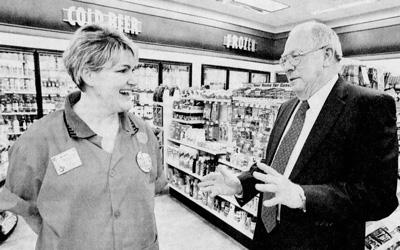
Description
This is an article in The Des Moines Register about the success of Casey's General Store. The article was published on May 29, 2011 by David Elbert and it focused on Casey's development over time and how the business has transformed to be successful on a…
Fred W. Fitch's Message to the Associated Master Barbers of America, November 1925
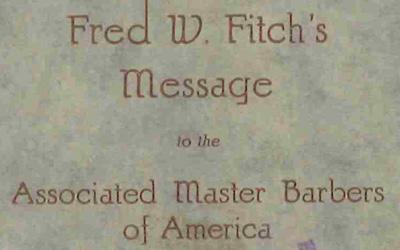
Description
This document is a speech given by Fred Fitch during the conference for the Associated Master Barbers of America in 1925. The speech outlined Fitch's thoughts and plans for the future of the profession.
"Fitch, 75, Scoffs at Luck As Aid to Success in Life," January 28, 1945
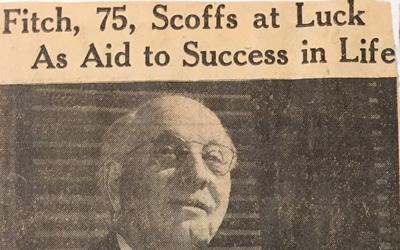
Description
This Des Moines Register article is a brief biography written about Fred Fitch as he celebrated his 75th birthday. The article outlines some of the major accomplishments in his career.
"Arthur Collins: Radio Wizard," 2002
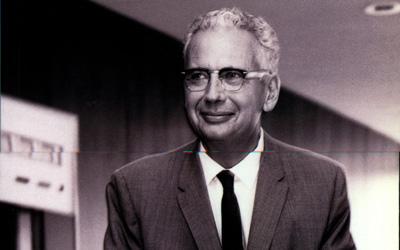
Description
This book is a biography about radio wizard Arthur Collins whose inventions and ideas transformed communication industry in multiple avenues including aeronautics and space communications, military communications, radio and television broadcasting and personal communication…
Excerpt from "In Search of a Better Way: The Lives and Legacies of Gary and Matilda Vermeer," 2008
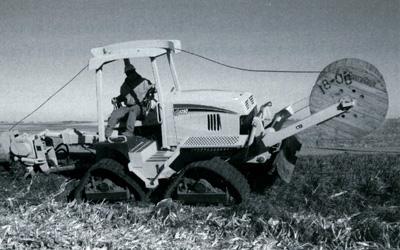
Description
These excerpts are from a book that highlights the lives of Vermeer Corporation founders Gary and Matilda Vermeer. Vermeer is an Iowa-born company that started in farm and construction equipment and has grown into an international corporation.
"At 88, John Pappajohn Still Works Harder Than You Do," September 11, 2016

Description
This 2016 article from The Des Moines Register focuses on the life, legacy and success of John Pappajohn. Pappajohn immigrated from Greece at the age of 9 months, and he grew up in Mason City, Iowa. He became a successful businessman in the state and a prolific…
Froelich Tractor in Iowa and South Dakota, 1892
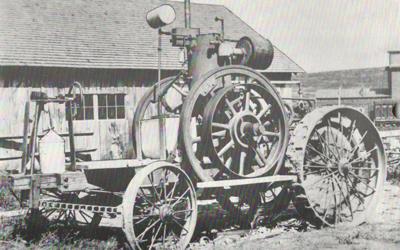
Description
These photographs show the Froelich Tractor in Iowa and South Dakota in 1892. The tractor was created by John Froelich, an American inventor who lived in Froelich, Iowa, a small village in northeast Iowa. His invention, shown in the photos, was the first stable gasoline/…
Excerpts from the "Shampoo King" Book, 1981

Description
This document includes excerpts from the book "Shampoo King," which outlines the career of Fred Fitch. Fitch created hair products and revolutionized his industry, which led to great success nationally and internationally.
Fitch Shampoo Advertisements, 1981
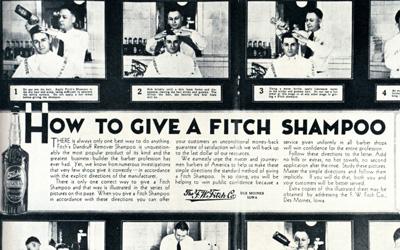
Description
Within the book "The Shampoo King," there are a series of example advertisements for various products produced by Fred Fitch's company that had been used in various media forms. Two of the advertisements are shown and one provides instruction as to how to apply Fitch's…
"Fred Fitch's Own Page," 1981
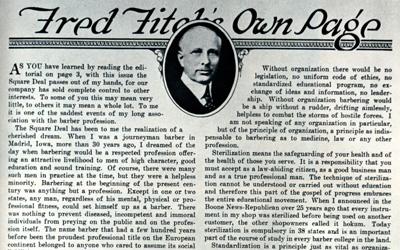
Description
This editorial was originally published in an issue of the magazine Square Deal, which Fred W. Fitch's company sold to another publisher. Fitch discusses three main major ideas that he believed would revolutionize the profession.
Biography of John Froelich from Iowa Inventors Hall of Fame Pamphlet, 1994
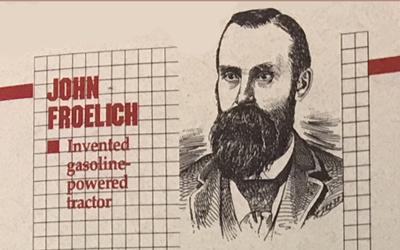
Description
This document is a brief biography of John Froelich, who was inducted into the Iowa Inventors Hall of Fame in 1991. Froelich was an American inventor who lived in Froelich, Iowa, a small village in northeast Iowa. He is best known for inventing the first stable…
Hy-Vee Historical Timeline, June 2015
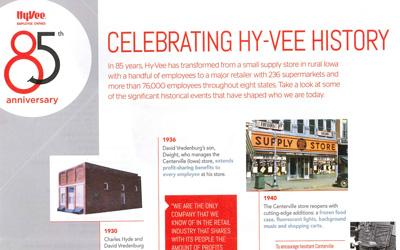
Description
This document is an 85-year-old timeline of the history of development and changes to Hy-Vee.
Additional Resource
- Business Entities Search - Iowa Secretary of State
This webpage from the Iowa Secretary of State's website allows the user to enter in the first few letters or words of a business entity name and retrieve a list of all business entities beginning with the same letters. This database contains important business information that is filed with the state.
Iowa Core Social Studies Standards (6th-12th Grade)
Listed below are the Iowa Core Social Studies content anchor standards that are best reflected in this source set. The content standards applied to this set are middle and high school-age level and encompass the key disciplines that make up social studies for 6th through 12th-grade students.
| No. | Standard Description |
| SS-Geo.9-12.17. | Analyze how environmental and cultural characteristics of various places and regions influence political and economic decisions. |
| SS-Geo.9-12.19. | Analyze the reciprocal relationship between historical events and the spatial diffusion of ideas, technologies, cultural practices, and the distribution of human populations. |
| SS-Geo.9-12.20. | Assess the impact of economic activities and political decisions on urban, suburban, and rural regions. |
| SS-US.9-12.22. | Evaluate the impact on inventions and technological innovations on the American society and culture. |
| SS-US.9-12.27. | Evaluate Iowans or groups of Iowans who have influenced US History. |